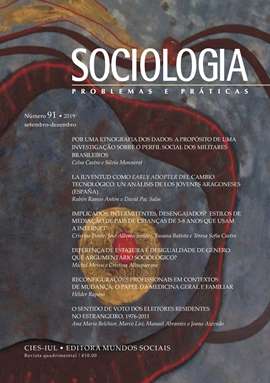Occupational reconfigurations in contexts of change: the role of general and family medicine
DOI:
https://doi.org/10.7458/SPP20199111167Keywords:
standardization, medical profession, clinical guidelines, general practiceAbstract
In the current regulatory framework of public health policies there is a greater public scrutiny upon medicine, and institutional actors have been engaged in the implementation of measures that seek to link professional interventions to the demonstration of their effectiveness and efficiency, namely through the so-called clinical guidelines. Considering the formal process of its implementation in Portugal, the aim of this article is to explore the reasons why general practice adheres to this standardization logic. Within the framework of a broader qualitative-intensive methodology, we present the empirical results obtained from the application of a set of semi-structured interviews with a limited number of privileged informants about the involvement of general practice in this process, as well as specific documentary support about its implementation in Portugal. The vulnerability of this professional segment to regulatory interference that has been triggered proved to be contingent, since the implementation of the clinical guidelines process implied a negotiation logic that ensured the participation of professionals in the modulation of this initiative itself and constituted an opportunity to reinforce the professionalization of this medical specialty.
Downloads
Published
Issue
Section
License
Authors who publish in this Journal must agree the following terms and conditions:
- Authors retain copyright and grant the Journal the right to first publication, while simultaneously agreeing to a Creative Commons Attribution License, which allows others to share their work on condition that they cite the original author(s) and recognise that the latter’s work was first published in this Journal.
- Authors are authorised to enter into additional contracts separately, for non-exclusive distribution of the version of the work that is published in this Journal (e.g. publication in an institutional repository or as a book chapter), subject to recognition of initial publication in this Journal.



